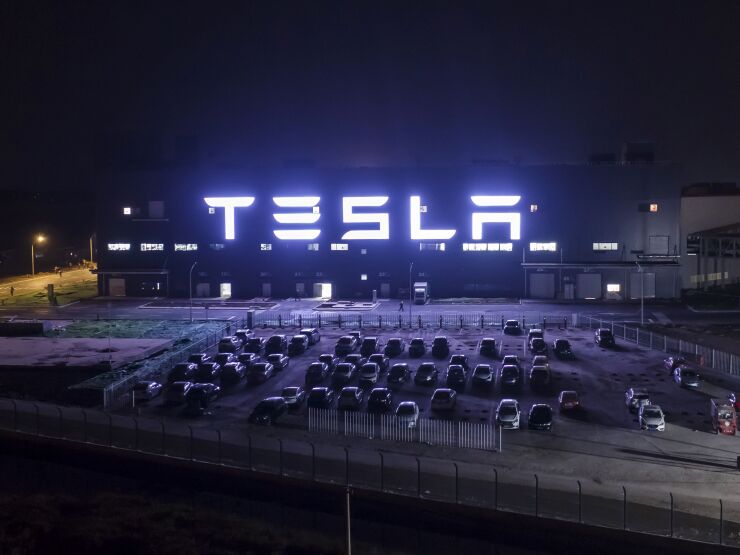Tesla last week priced its latest auto-lease securitization at signficantly reduced spreads from its last deal—reflecting strong investor demand for TALF-backed securities and an improving outlook for the world's largest battery-electric vehicle (BEV) manufacturer that turned in a surprise second-quarter profit.
The company's $779.53 million Tesla Auto Lease Trust (TALT) 2020-A transaction included three tranches of senior, triple-A rated notes pricing between coupons of 0.55%-0.78%, compaored to rates of between 2.13%-2.2% for a similar stack of bond tranches in its deal in 2019.
The $709 million in notes across eight tranches included $214.79 million in Class A-2 notes due May 2023, $198.26 million in notes due December 2023, and $67.06 million in Class A-4 notes also due December 2023. Each carries a preliminary Aaa rating from Moody's Investors Service.
A $71.4 million Class A1 money-market tranche is rated P-1, Moody's highest short-term rating. All of the Class A notes benefit from 30.75% credit enhancement, which includes subordination support from four junior-note classes maturing in 2024 with ratings ranting between Aa2 and Ba2.
All the bonds were priced a week after Tesla announced improved year-over-year second-quarter earnings and rising margins boosted by an unexpected rise of sales and leases of its three core BEV models in the midst of the coronavirus pandemic. The company's stock has been on a tear in 2020, rising more than 280% per Bloomberg as other global automakers suffer from the fallout of the global coronavirus pandemic.
TALT 2020-A is the first securitization in 2020 by Tesla Finance of contracts financing purchases of the Model S, Model X and Model 3 all-electric autos manufactured by Tesla.

Citi was the structuring lead on the deal, and Barclays Bank, Credit Suisse Group and Deutsche Bank Securities will each hold the joint-lead title, according to Finsight. The company completed three similar deals in 2019 and 2018, each in the Rule 144a market.
Moody’s says the transaction’s strengths are the high quality of the lessees and the building of credit enhancement as the collateral pool amortizes. Tesla’s customers tend to be affluent, and the weighted average FICO of loan-pool borrowers is 791, one point higher than the average of last year’s deal. The report notes the current deal’s score is even marginally higher than other recent auto lease ABS pools, with BMW and Mercedes average scores respectively at 789 and 790.
A key risk concern for Tesla auto-lease securitizations is the limited history of aftermarket price performance of its vehicles. Tesla maintains "tight control" of the resale channel of leased-vehicles, unlike other manufacturers who normally offer up turned-in vehicles to the independent auction market. The company only has "limited data" on the used Model S and Model X numbers, "and almost no data on off-lease Model 3 vehicles which accounts for approximately 50% of the securitization pool," according to Moody's.
Tesla established a discounted base residual value (as a percentage of the deal's securitization value) of 56.6%, which is higher than the 55.8% RV setting for Tesla's 2019 auto-lease ABS pool. The rising number represents high exposure risk to investors, who see RV risk a greater issue than credit performance-risk in auto lease ABS pools.
But the current deal is being issued after Palo Alto, Calif.-based Tesla saw its Moody's corporate-family rating recently upgraded to B2 from B3, as well as an improved speculative-grade liquidity rating of SGL-2 from SGL-3. The upgrades came in the wake of Tesla's improved earnings for the second quarter. The company reported revenues of $6.04 billion (up from $5.4 billion) resulted in margins rising "steadily" to 8.5% as of June 2020, and its cash position building to $8.6 billion. Although the company improved with higher production levels of its vehicles (it delivered more than 90,000 vehicles during the quarter) and had "better cost absorption," a signficant gain in its margins was from the sale of about $1 billion in excess emmission credits to other global automakers in the past year.
“Securitizations backed by leases from smaller, more specialized and financially weaker manufacturers are more susceptible to event risk than those backed by stronger and more diversified incumbent manufacturers that are supported as a result of greater vehicle diversification and higher manufacturer durability,” the report says.
"It will be important for Tesla, over time, to strengthen the profitability of its core BEV operations and to become less reliant of the sale of these credits," Moody's report stated.
Tesla maintains a dominant share in the global BEV market—including a 90% share in the U.S.
The company still faces "important governance, financial and operational challenges,” Moody’s says, such as $3.2 billion of debt maturing over the next 12 months as well as the need to fund a "potentially sizeable capital expenditure and expansion program."





